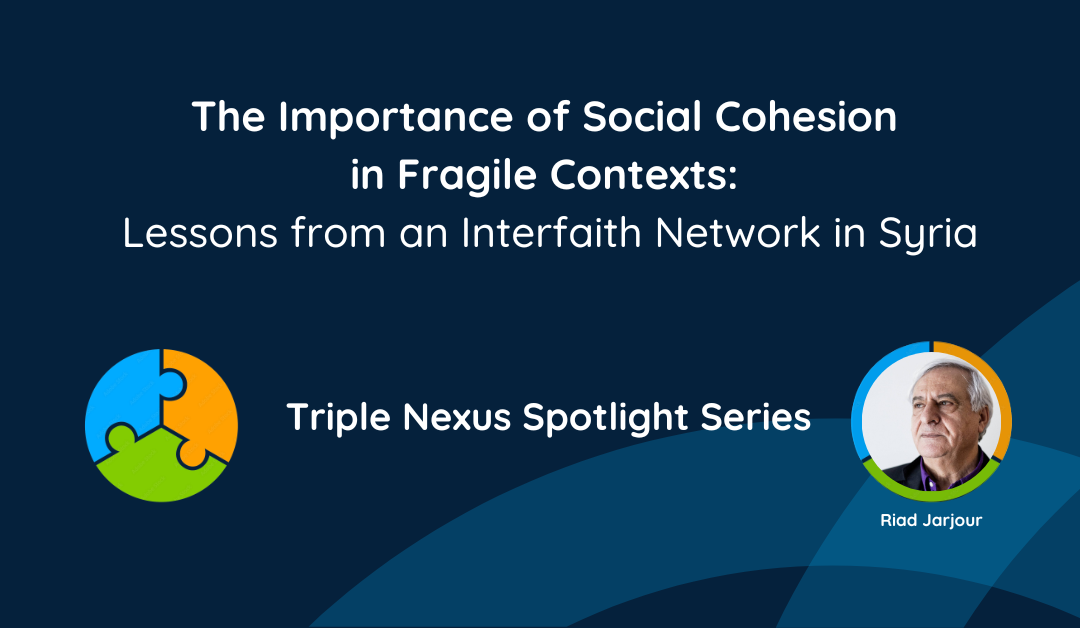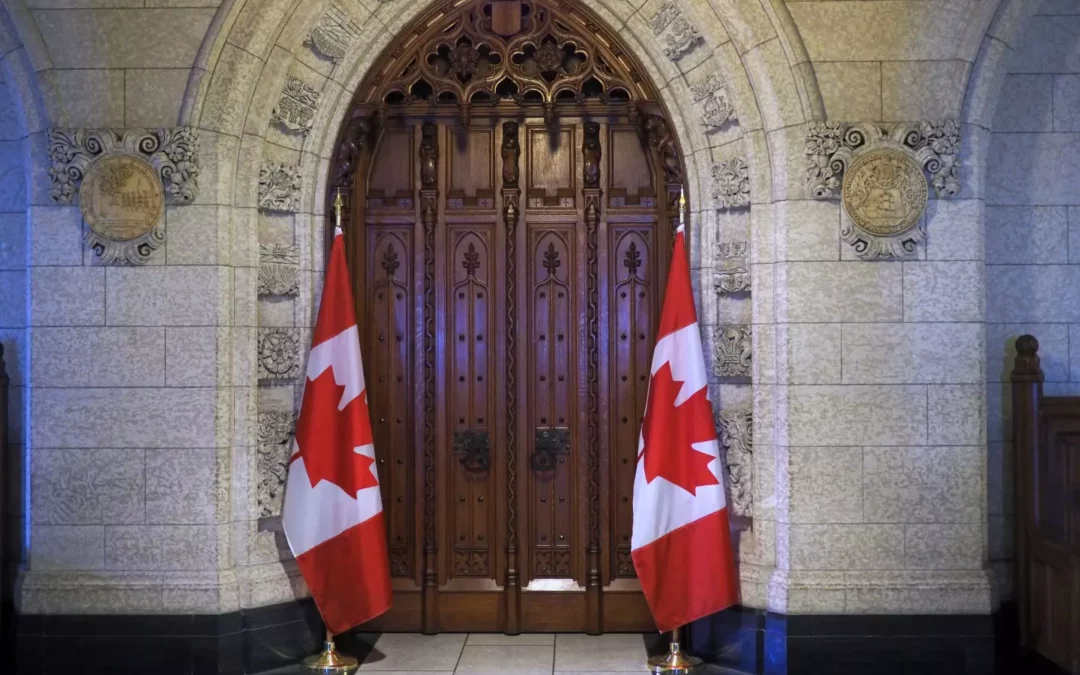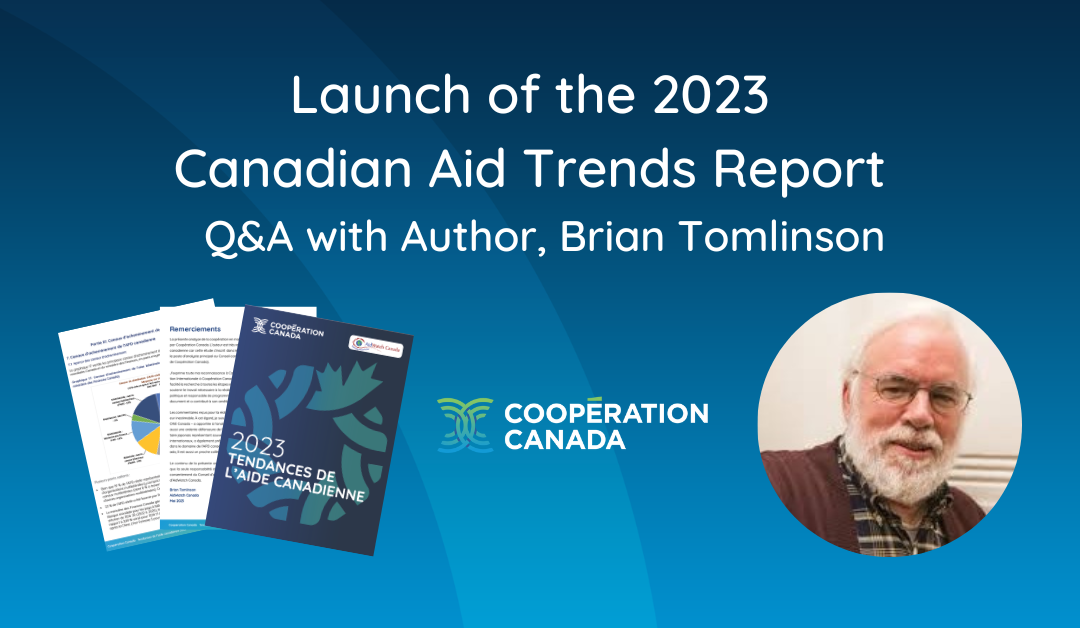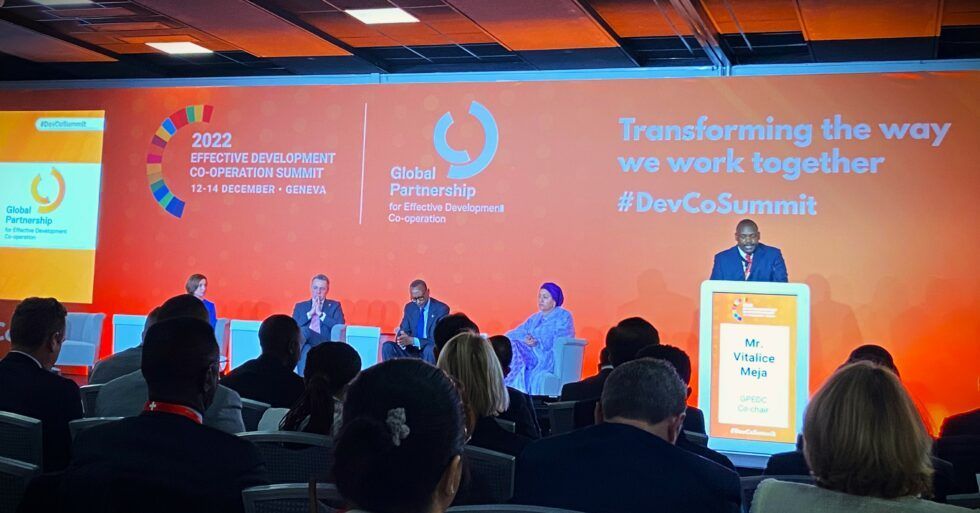
by Cooperation Canada | Oct 24, 2023 | Development Effectiveness, Members' Spotlight, News, Policy
This story is part of Cooperation Canada’s triple nexus Spotlight Series. It was initially posted on October 30, 2014 (https://mccintersections.wordpress.com/2014/10/30/humanitarian-assistance-and-social-cohesion-in-syria/)
In any situation of crisis or conflict, the provision of humanitarian assistance aims to address basic needs related to the subsistence of those most deeply impacted. Responding to needs related to food security, water, sanitation, hygiene, and shelter involves technical considerations requiring immediate attention. However, the provision of humanitarian assistance also provides an opportunity to engage affected communities in less obvious, but equally critical, strategic work aimed at the preservation and building of social cohesion. These represent strategic situations wherein the triple nexus approach can be implemented, bringing together humanitarian, development, and peace programming.
Through grassroots initiatives that foster positive relationships within communities threatened by the divisive factors of sectarianism, solidarity and trust can be achieved and sustained in the midst of open conflict. This conviction lies at the center of the philosophy of Mennonite Central Committee partner, the Forum for Development, Culture and Dialogue (FDCD) as it approaches its work in providing humanitarian assistance with a peace lens to internally displaced persons (IDPs) in Syria.
Although the Syrian crisis has spared few as it has moved from village to village, certain areas have remained relative safe havens for those forced to flee their homes as the result of intense and often indiscriminate violence. The Qalamoun region, straddling the highway from Damascus to Homs in central Syria, is one such area. The diverse composition of the region provides a distinctive context to observe the tactical practice of distributing humanitarian assistance in a multi-faith environment where villages are often segregated by faith groups.
While Syrian communities are long known for their hospitality, host community tensions exist in Qalamoun, as they do across Syria, especially when resources are scarce. Despite these challenges, the people of Qalamoun were able to respond to those seeking refuge from the intense violence in Aleppo, Homs and Damascus. In addition to welcoming displaced families into their shops, homes, and schools, the people of Qalamoun immediately began organizing efforts to provide food and hygiene items to their new guests. As more IDPs arrived, the need for greater humanitarian support became evident. FDCD, working closely with its contacts in the Qalamoun region, formed a local interfaith network of distributors and coordinators to respond to the crisis.
The purposeful inclusion of both Christian and Muslim partners in this process proved to advance the peace dimension of the nexus approach employed by FDCD. Beyond the successful distribution of in-kind assistance to displaced families, this network produced new forms of trust and cooperation between faith groups.
This was further evident in the community’s response to the Syrian opposition’s attempt at controlling the region, including the town of Sadad, seizing vehicles and limiting local residents’ ability to evacuate the area. Responding to this, FDCD’s interfaith network quickly coordinated an effort to provide transportation. When the presence of anti-government forces in the area caused the movement of non-Muslims to be risky and greatly hindered, the Muslim communities of Qalamoun utilized their own vehicles to facilitate the safe evacuation of members of the Christian community to other villages in the area. In this regard, the deep partnership facilitated through the organization and distribution of humanitarian assistance in Qalamoun proved to be invaluable in the protection of the Christian community during this period of persecution and crisis.
While the Battle of Qalamoun was undoubtedly destructive, the experience of FDCD shows how an interfaith network made important contributions in mitigating the impacts of armed conflict. As shown above, the strategic benefits of its deliberate approach to humanitarian distribution are clear, supported by an added peace lens centered on interfaith social cohesion.
A historically diverse community in Qalamoun continues, to this day, to provide an example for how Muslims and Christians can work to navigate the ongoing tensions between host and displaced communities within the context of the ongoing Syrian conflict. As many communities in Syria fall prey to the vicious cycles of hate, exclusion, and persecution, the experience of FDCD attests to the value of localized interfaith approaches to peace and humanitarianism. Although we cannot predict when the Syrian crisis will end, the preservation of new forms of social cohesion resulting from this interfaith network will be crucial in the country’s early recovery and post-conflict development. These continued relationships will become central in preventing the spread of hate and sectarianism, working together to achieve mutual understanding, respect, coexistence and dialogue.
Lessons learned, from MCC:
- With increased attention to a triple nexus approach, strategic planning for this is needed in the program design phase.
-
- It is an oversimplification to assume that, for example, a few peacebuilding workshops will achieve this goal. There is a need to think through how to contribute to social cohesion and early recovery/development over the long term and how to incorporate that into planning.
- Resources are needed before project implementation to conduct proper conflict analysis/mapping.
-
- There is always a danger of humanitarian aid being used/diverted to align with local/regional political goals
-
- NGOs must be aware of these dynamics as they implement large humanitarian projects.
- There is a need for flexible funding by donors.
-
- While institutional donors are encouraging a triple nexus approach, most funding is still restricted to certain activities (i.e., food security). With limited or restricted resources, NGOs can have a hard time knowing how to incorporate social cohesion and development programing, especially where there are limited resources for other areas that donors want to prioritize – gender, protection, capacity building, etc.
- There is a need for donors to think long term.
-
- Most institutional funding is short term, but it is unrealistic to adopt a triple nexus approach with short term funding. Changes in social cohesion or shifts from humanitarian aid to early recovery/development involve long term thinking.
Lessons learned, from FDCD:
- For sustainable peace to be maintained resources should be shared without discrimination and considerations for the host community’s needs should also be prioritized. This case shows that when treated equally, Christians and Muslims recognize each other’s dignity
- When local and international organizations come together, such as MCC and FDCD, to implement triple nexus within communities facing conflict in Syria, this can support the enabling of harmony, trust building, and reconciliation to its people after years of war and conflict.
This piece was first published in 2014 in MCC’s quarterly publication, Intersections, and authored by Riad Jarjour, the General Secretary of the Arab Group for Muslim-Christian Dialogue and president of the Forum for Development, Culture and Dialogue (FDCD), based in Lebanon and Andrew Long-Higgins, a former Intern at FDCD. This piece was updated for Cooperation Canada in 2023 by Garry Mayhew.

by Cooperation Canada | Apr 12, 2023 | Global Affairs Canada, Policy
The ambitious objectives outlined in Canada’s Feminist International Assistance Policy (FIAP) can only be achieved in consultation with international and local civil society. Coherent with the Istanbul Principles and related frameworks such as the International Framework for CSO Development Effectiveness and the Busan Global Partnership for Effective Development Cooperation, FIAP is strengthened by a Policy on Civil Society Partnerships for International Assistance (the CSO Partnership Policy). Constructed in consultation with civil society, this policy outlines and defines how Global Affairs Canada (GAC) will engage with civil society actors on the implementation of the FIAP across nine action areas.
Nine action areas include:
- Empowering women and girls, promote gender equality, and reach the poorest, most vulnerable and most marginalized as the most effective means to eradicate poverty
- Facilitating a safe and enabling environment for civil society
- Protecting human life and dignity
- Fostering CSO leadership in innovation
- Integrating the role of CSOs as independent actors into international assistance programming
- Establishing more predictable, equitable, flexible, and transparent funding mechanisms
- Fostering multi-stakeholder approaches to international assistance
- Engaging Canadians as global citizens in international assistance
- Promoting sustainability, transparency, accountability, and results
Policy Objectives – CSO Implications
The human rights-based feminist approaches of FIAP require fundamental shifts in the structures, policies, processes, and programs of civil society actors working with GAC. Many of these shifts require institutional prioritization and resources, as we learned from civil society organizations (CSOs) partaking in the Women’s Voice and Leadership initiative.
Integrating considerations that account for gender norms and existing inequalities as well as devising tools and processes that allow for more gender-responsive and gender-transformative programs is a sector-wide challenge that can be achieved through collaboration, predictable and inclusive consultations, and continuous learning among diverse partners. To support these efforts, GAC and Canadian civil society crafted a policy outlining the entry points for strengthened government-civil society collaboration.
The CSO Partnership Policy highlights the responsibility of civil society actors to consult marginalized groups, including women and girls and ensure their perspectives are integrated across all areas of program design, delivery, and evaluation. Specifically, organizations are called to employ human rights-based approaches and institutionalize gender-based analysis in all of their work. CSOs should also collaborate with local/national responders as indicated through the guidance A Feminist Approach: Gender Equality in Humanitarian Action to strengthen the organizational and response capacity of local humanitarian actors as well as their long-term sustainability.
Implementation Plan
The CSO Partnership Policy is operationalized through the Implementation Plan, which lists proposed action for each of the nine action areas outlined above. To ensure progress towards the targets outlined in the Implementation Plan, Global Affairs Canada and Cooperation Canada have convened a Civil Society Policy Action Group (CPAG), which is open to civil society actors across the country. The two co-leads comprise the CPAG Secretariat, which on the GAC side reports to the Assistant Deputy Minister (ADM) for the Partnerships for Development Innovation Branch. CPAG gathers specialists from the sector, with each of the nine action areas co-led by representatives from relevant GAC teams and CSOs, who in consultation with broader coalitions formulate recommendations for policy implementation.
In 2018, CPAG devised a national survey, which informed the prioritization of: Objective 1 (Empower women and girls and promote gender equality); Objective 6 (Establish more predictable, equitable, flexible, and transparent funding mechanisms); and Objective 8 (Engage Canadians as global citizens). The implementation plan for the remaining objectives were approved in 2019, offering a policy tool for CSOs working towards a range of FIAP targets.
High-Level Narrative Update on Progress
In 2022, the CPAG produced a series of high level narrative updates on progress. The progress update captured key accomplishments, challenges and opportunities. They were presented in June 2022, as part of the annual CSO-GAC dialogue co-hosted by Cooperation Canada and Global Affairs Canada.
Next Steps
CPAG is re-convening in 2023 to examine the group’s mandate and reinvigorate progress towards the CSO policy in a changing international cooperation context.

by Cooperation Canada | Oct 27, 2021 | Feminist International Assistance Policy, International Development, News, Policy
Cooperation Canada congratulates the members of Canada’s 44th Cabinet under the leadership of Justin Trudeau who were sworn in yesterday. We look forward to working with cabinet ministers and their staff as they address the urgent, yet complex, challenges of ending the COVID-19 pandemic and ensuring a strong economic recovery, while addressing the gaps in social safety nets that the pandemic has highlighted, and mitigating the ongoing climate emergency.
Our sincere gratitude is extended to the outgoing Minister Karina Gould, an unwavering believer in international cooperation and solidarity, whom we wish all the best in her new mandate of advancing social prosperity in the domestic context. We are looking forward to working with Minister Harjit Sajjan, who will be taking on the international development portfolio. This is a critical time for international cooperation, and we are excited to support the Honourable Sajjan in his efforts to ensure Canada’s Feminist International Assistance Policy is prioritized, adequately resourced, and strategically implemented.
As traditional foreign and national priorities increasingly overlap, Canada’s international cooperation is emerging as a core pillar of the country’s future prosperity, impacting our health, economy, and our ability to help solve our environment and humanitarian crises such as the one in Afghanistan. We look forward to working with ministries whose work spans across all pillars of Canada’s global engagement, including those of climate justice, human rights, racial and gender justice, refugee protection, diplomacy, defense, equitable international trade, and environmental sustainability. We also look forward to working with Ministers Chrystia Freeland, Mona Fortier, and Diane Lebouthiller to ensure Canada’s global engagement is fair and backed by sufficient resources, enabling legislative and regulatory frameworks and civic space.
As a national association of organizations working in international development and humanitarian contexts, Cooperation Canada has informed Canada’s global engagement for over fifty years. We look forward to continuing our collaboration with political leaders in this pivotal moment of Canada’s history, which calls on investing in solutions to global challenges that affect us everywhere.
Media Inquiries
[email protected]
by coopcanada2020 | Jul 27, 2021 | News, Policy
Why are we talking about the Official Development Assistance Accountability Act?
Canada’s international assistance is legislatively outlined in the Official Development Assistance Accountability Act (ODAAA). In force since 2008, ODAAA sets the terms for the eligibility of funding considered as the Official Development Assistance (ODA) and applies to all relevant federal departments. As such, the ODAAA is of instrumental value for all Canadian organizations engaged in international cooperation, many of which were a part of the co-construction process that led to the bill’s adoption.
Multiple amendments of significance have been made to the ODAAA since it was adopted. One has changed the very definition of ODA already, while Private Members’ Bill C-287, presented by the Conservative Party’s Opposition Critic for International Development, Garnett Genuis, seeks to further edit the provisions of the ODAAA. To cast light on this bill and its importance for our sector, the impact of the recent legislative amendments, and the proposed changes, Cooperation Canada has prepared this short guide.
What does the ODAAA entail?
The bill protects the integrity of ODA, understood as funding “with a central focus on poverty reduction and in a manner that is consistent with Canadian values, Canadian foreign policy, the principles of the Paris Declaration on Aid Effectiveness of March 2, 2005, sustainable development and democracy promotion and that promotes international human rights standards”. ODA is therefore interpreted in section 1 as the funding:
- Aimed at “promoting the economic development and welfare of developing countries” in a concessional character, meaning that at least some portion (in this case 25 percent) must be in the form of a grant, as per the three-point criteria outlined below; and
- Is aimed at humanitarian assistance.
Development (understood very broadly as non-humanitarian assistance) ODA must meet the three-criterion test, which suggests that ODA-eligible funding must be:
- Contributing to poverty reduction;
- Taking into account the perspectives of the poor; and
- Consistent with international human rights standards.
In this way, Canada’s legislation guarantees a human-rights-based approach to international assistance, which must be applied regardless of any institutional policies. Global Affairs Canada guidance documents offer instruments for the interpretation of all three criteria items.
The bill requires government reporting on ODA, including the Report to Parliament on the Government of Canada’s Official Development Assistance (which is generally co-produced by the Minister of International Development and the Minister of Foreign Affairs) and the Statistical Report on International Assistance, published by Global Affairs Canada for each fiscal year.
Recent changes to the ODAAA
In 2019, the ODAAA was amended to align with the ODA definition “published on the website of the Organisation for Economic Co-Operation and Development [OECD].” In force since June 2021, this amendment changes the calculations from the new grant equivalent measure. While the past OECD guidance and the original text of the ODAAA both referred to ODA with a grant equivalent of at least 25 percent (calculated at a rate of discount of 10 percent), the current Development Assistance Committee (DAC) consideration of ODA-eligibility based on the grant element is more complex, varying across countries’ economies and type of assistance, as outlined here.
The updated version of this bill, however, still protects the three-point criteria outlined above and other reporting requirements and other elements of this bill. Additional amendments (since 2013 and 2018) have further repealed some provisions relating to the reporting requirements pertaining to Canada’s influence on the Bretton Woods Institutions and resulted in a single report outlining Canada’s assistance across various multilateral and bilateral channels. Additional changes have eroded the transparency of Canada’s ODA reporting, particularly around the transparency of official development assistance and the predictability of the base levels of the international assistance envelope.
The bill also calls for government consultations on ODAAA (which are organized by the Ministry of Finance every two years – Cooperation Canada’s latest submission is here) and the Statistics Report. The recent amendments stand the chance of loosening up criteria for ODA (by reducing the threshold for grant-equivalent percentage of the funding), this can only happen through broader erosion of ODA criteria at the OECD DAC level. With the latest amendments in mind, the coordinated action of civil society at the OECD DAC level, as well as with the Global Affairs Canada teams informing Canada’s position at this global forum, assume great importance.
Don’t fix what’s not broken? Implications of Bill C-287 proposed changes
In April 2021, MP Garnett Genuis tabled Bill C-287, which aims to add additional elements to the three-point criteria outlined above, which would prevent Canada’s ODA from being allocated to foreign governments that have arbitrarily detained Canadian citizens or permanent residents, or have “engaged in a crime against humanity, genocide or a war crime.” Lastly, an additional criterion proposed in C-287 requires ODA to be consistent with Canada’s broader efforts of international peace and security.
Cooperation Canada welcomes all conversations and legislative changes that can improve the effectiveness of Canada’s international assistance. While we believe that great strides can be made around the predictability, transparency, inclusivity, and broader scale of Canada’s international assistance, the proposed bill does not reflect the current priorities of Cooperation Canada.
Canada’s international assistance is, to a significant extent, dedicated to humanitarian assistance, which follows global humanitarian principles of impartiality and neutrality, prioritizing the lives and livelihoods of crisis-affected populations (civilians who, according to the international conventions, cannot be held accountable for the actions of their governments) over political interests of any such actors.
While we agree with the importance of ensuring ODA reflects normative stances of Canadians and international commitments, the existing criteria already protect the human rights standards of ODA, as well as the broader category of poverty alleviation, which is contingent on the cessation of conflict and the achievement of international peace. Lastly, Canada’s ODA is largely allocated through multilateral organizations that depend on flexible funding to direct international assistance to those where it is most needed. As such, Canada, much like other countries contributing to multilateral arenas, cannot exercise undue influence on these organizations and earmark countries where Canada’s assistance can and cannot be deployed. The effectiveness and the efficiency of multilateral institutions are also protected by global governance frameworks of the OECD DAC and the UN, which would make ODAAA criteria incompatible with Canada’s global commitments.
Interested in learning more about ODA?
Canadian civil society has weighed in on approaches to ensuring that Canada’s international assistance respects the provisions of ODAAA. A Time to Act report outlines key insight based on discussions organized by the Canadian Council for International Cooperation (CCIC, now Cooperation Canada).
A broader case for Canada’s Official Development Assistance is presented in the Together Project, which outlines the achievements of Canada’s global engagement and traces a way forward for a strategic scale-up aimed at solving global challenges affecting us everywhere. The Together Project also outlines strategic areas of intervention across 11 thematic areas.
The Together Project amplifies the voice of the entire sector, calling for increased international assistance. Despite the long-standing international commitments, Canada contributes less than half of its global fair share, investing only 30 cents for every $100 of its national income in solutions to global challenges such as poverty, inequality, climate emergency, and global pandemics. Using an evidence-based approach, the Together Project urges the country’s leaders across the political spectrum to commit to sustainable increases of Canada’s international assistance that reflects the urgency of our global challenges.
*Cooperation Canada is grateful to Brian Tomlinson (Aid Watch Canada) for his insight and guidance throughout this analysis.






